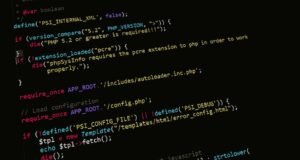Will AI Take Over?
Artificial Intelligence (AI) has become an integral part of our daily lives, from virtual assistants like Siri and Alexa to self-driving cars. With advancements in technology, there is growing speculation about whether AI will eventually take over. While the potential for AI to revolutionize industries is undeniable, it is essential to examine the implications and potential risks involved.
Key Takeaways:
- AI is rapidly advancing and becoming more prevalent in various aspects of life.
- There are both benefits and risks associated with the advancement of AI.
- Human intervention and ethical guidelines are crucial in shaping the development of AI.
AI has made significant strides in recent years, allowing machines to perform tasks that were once exclusively limited to human capabilities. From diagnosing diseases and driving cars to analyzing massive amounts of data, AI has demonstrated incredible potential. *However, it is important to note that AI is still far from achieving true human-like intelligence.* While AI can excel in narrow areas, it lacks the creativity, emotions, and diverse understanding that make humans unique.
The Benefits of AI
AI offers numerous benefits across various industries, enhancing productivity, efficiency, and accuracy. Some notable benefits include:
- Automation of repetitive and mundane tasks, freeing up human resources for more complex and creative work.
- Faster and more accurate data analysis, leading to more informed decision-making.
- Improved customer experiences through personalized recommendations and efficient support systems.
*Imagine a world where tedious manual data analysis is handled by AI systems, allowing professionals to focus on innovation and problem-solving.* This shift can spur economic growth, streamline processes, and improve overall efficiency.
The Risks and Ethical Considerations
While AI offers great potential, it is not without risks. Some of the key concerns surrounding AI development include:
- *The potential displacement of human workers*, as AI continues to automate tasks traditionally performed by humans.
- Privacy and security concerns, as AI systems gather and process vast amounts of personal data.
- Ethical considerations, such as biased algorithms and decisions based on incomplete or flawed data.
*The ethical implications of AI are particularly critical.* Developers must ensure that AI algorithms are fair, transparent, and unbiased to prevent perpetuating discrimination or injustice.
To better understand the impact of AI, let’s take a look at some relevant data:
| Year | Estimated AI Market Value (in billions) |
|---|---|
| 2020 | $55.5 |
| 2021 | $61.1 |
| 2022 | $68.1 |
As seen in the table, the market value of AI is expected to continue growing significantly in the coming years, indicating the increasing relevance and adoption of AI technologies.
The Role of Human Intervention
It is important to recognize that AI is a tool created by humans, and ultimately, humans have the power to shape its development and implementation. *Human intervention is crucial in setting guidelines and regulations to ensure AI is used responsibly and ethically.* Governments, organizations, and individuals must collaborate to create frameworks that protect privacy, prevent misuse, and address the risks associated with AI.
The Future of AI
While AI has the potential to transform industries and improve our lives, it is unlikely to completely replace humans. Instead, the integration of AI with human intelligence can lead to unprecedented advancements. By leveraging the unique capabilities of both AI and humans, we can develop innovative solutions to complex problems, facilitate new discoveries, and drive progress.
As AI continues to evolve, it is crucial to maintain a balanced perspective, embrace the benefits, mitigate the risks, and shape its development in a way that aligns with our values and goals.
| Industry | Percentage of Companies Using AI |
|---|---|
| Healthcare | 54% |
| Finance | 40% |
| E-commerce | 25% |
These statistics highlight the widespread adoption of AI across various industries, showcasing the versatility and potential impact of AI technologies.

Common Misconceptions
AI will become self-aware and take over the world
One common misconception about AI is that it will eventually become self-aware, develop consciousness, and take over the world. While AI has made significant advancements in machine learning and natural language processing, it is still far from achieving true consciousness. The idea of an AI taking over the world is often depicted in popular movies and books, but it is purely science fiction.
- AI technology is designed to perform specific tasks and does not possess the ability to think or reason like humans.
- The development and implementation of ethical frameworks ensure that AI systems adhere to predefined boundaries.
- In reality, AI is designed and programmed by humans, making it highly unlikely for AI to develop its own intentions and desires.
AI will replace human jobs completely
Another misconception is that AI will replace human jobs completely and render many professions obsolete. While AI technology has the potential to automate certain repetitive or labor-intensive tasks, it is unlikely to replace all human jobs entirely. Instead, AI is more likely to augment human capabilities and reshape job roles and responsibilities.
- AI technology can take over mundane, repetitive tasks, allowing humans to focus on more strategic and creative aspects of their work.
- AI can enhance productivity, efficiency, and accuracy in many industries, leading to job growth and new opportunities.
- Human skills such as emotional intelligence, critical thinking, and creativity are difficult to replicate, making certain professions less susceptible to automation.
AI is an all-knowing entity that is infallible
There is a misconception that AI is an all-knowing entity that is infallible and cannot make mistakes. However, AI systems are only as good as the data they are trained on and the algorithms used. Despite remarkable advancements, AI technology still has limitations and can make errors and biases.
- AI algorithms can be biased if the training data they are fed contain biases or incomplete information.
- AI systems need to be continuously monitored and updated to ensure accuracy and reliability.
- Human intervention and oversight are essential to prevent AI from making incorrect or harmful decisions.
AIs will have emotions and empathy like humans
Many people believe that AI will eventually have emotions and empathy like humans. Although AI can be programmed to mimic certain emotions or behaviors, true emotions and empathy require subjective understanding and consciousness, which current AI technology lacks.
- AI lacks the ability to experience emotions at a subjective level and lacks the capacity to empathize with others.
- The emotional responses displayed by AI are based on predefined rules and algorithms rather than genuine emotional experiences.
- AI’s lack of consciousness and self-awareness prevents it from developing genuine human-like emotions and empathy.
AI will control and manipulate humans
One common misconception is that AI will have control over humans and manipulate them to achieve its own goals. AI technology does have the potential to influence human behavior through personalized recommendations and targeted advertising, but this does not equate to control or manipulation.
- AI algorithms rely on data analysis and pattern recognition to predict user preferences and behavior.
- AI can be programmed to optimize certain outcomes, but it does not possess the ability to exert direct control over humans as it lacks consciousness.
- Human agency and decision-making still play a crucial role in determining how AI recommendations and suggestions are acted upon.

Jobs Most Likely to be Automated by AI
In a world increasingly driven by artificial intelligence, certain jobs are more at risk of being automated than others. This table showcases different occupations that may be vulnerable to AI takeover, based on a combination of technological advancements and industry trends.
| Occupation | Probability of Automation (%) |
|---|---|
| Cashiers | 97% |
| Telemarketers | 99% |
| Travel Agents | 87% |
| Bookkeepers | 98% |
| Data Entry Operators | 96% |
AI Adoption in Healthcare
The potential for AI in the healthcare sector is vast, with applications ranging from diagnosis to treatment. This table demonstrates the adoption of AI technologies in different medical specialties, reflecting the industry’s endeavor to enhance patient care through advanced algorithms.
| Specialty | AI Adoption Level (Scale: Low to High) |
|---|---|
| Radiology | High |
| Dermatology | Medium |
| Oncology | Low |
| Pathology | Medium |
| Psychiatry | Low |
Rise of AI in Financial Services
The financial services industry is gradually embracing the potential of artificial intelligence. This table explores the adoption of AI in various sectors within finance, showcasing how the technology is revolutionizing processes and decision-making.
| Sector | Level of AI Adoption (Scale: Low to High) |
|---|---|
| Customer Service | Medium |
| Investment Management | High |
| Risk Assessment | Low |
| Fraud Detection | High |
| Algorithmic Trading | High |
AI Applications in Transportation
Artificial intelligence is revolutionizing the transportation industry, leading to safer and more efficient systems. This table highlights the various applications of AI in different modes of transportation, offering a glimpse into the future of mobility.
| Mode of Transportation | AI Application |
|---|---|
| Cars | Self-driving technology |
| Airlines | Predictive maintenance |
| Trains | Automated signaling |
| Ships | Autonomous navigation |
| Bicycles | Smart route planning |
Impact of AI on Job Creation
While AI threatens certain job roles, it also creates new opportunities. This table illustrates different job sectors where AI is projected to lead to job creation, positioning humans in roles that utilize and collaborate with AI technologies.
| Sector | Estimated Job Increase |
|---|---|
| AI Research | 500% |
| Cybersecurity | 215% |
| Robotics | 300% |
| Data Science | 140% |
| Virtual Reality | 200% |
Gender Bias in AI Algorithms
AI algorithms are designed to be objective, but they can inadvertently perpetuate biases. This table showcases examples of gender biases that have been observed in AI algorithms, highlighting the need for proactive measures to prevent discrimination.
| Application | Observed Gender Bias |
|---|---|
| Recruitment | Preferenced male candidates |
| Sentencing | Harsher sentences for women |
| Language Translation | Gender-stereotyped translations |
| Speech Recognition | Higher accuracy for male voices |
| Virtual Assistants | Enforced subservient stereotypes |
AI in Arts and Creativity
Artificial intelligence is challenging conventional notions of creativity and artistic expression. This table explores various AI-based projects and their influence in the domains of art, music, and literature, posing intriguing questions about the intersection of AI and human creativity.
| Project | Domain |
|---|---|
| The Next Rembrandt | Painting |
| Aiva | Music |
| Shelley | Poetry |
| DeepArt.io | Image Manipulation |
| AI Dungeon | Interactive Fiction |
AI Ethics and Accountability
As AI becomes increasingly integrated into society, ethical considerations and accountability are crucial. This table highlights key principles and frameworks proposed by experts to guide the ethical development, deployment, and regulation of AI.
| Principle/Framework | Description |
|---|---|
| Transparency | AI systems should be explainable and understandable. |
| Privacy | AI should respect and protect individuals’ privacy. |
| Fairness | Avoiding biases and ensuring equal treatment for all. |
| Accountability | Establishing responsibility for AI actions and outcomes. |
| Human Control | Ensuring humans can override AI decisions. |
Public Perception of AI
Public opinion plays a significant role in the adoption and acceptance of AI technologies. This table presents the results of a global survey on public perception, shedding light on people’s attitudes, concerns, and expectations regarding artificial intelligence.
| Attitude | Percentage of Respondents |
|---|---|
| Optimistic | 64% |
| Concerned | 22% |
| Indifferent | 8% |
| Uninformed | 6% |
Artificial intelligence has the potential to revolutionize various aspects of our lives, from the workplace to healthcare and beyond. While AI adoption brings both opportunities and challenges, the key lies in proactive management to ensure ethical and fair implementation. As society navigates the complexities of AI technology, public perception and engagement will play a vital role in shaping its future.
Will AI Take Over? – Frequently Asked Questions
General Questions
What is AI?
Can AI surpass human intelligence?
Will AI eventually take over all jobs?
Is AI capable of emotions?
AI Safety and Ethics
Are there any risks associated with AI?
How can AI be made safe?
Can AI become malicious or take control?
Economic and Social Impact
Will AI lead to unemployment?
How will AI impact society?




